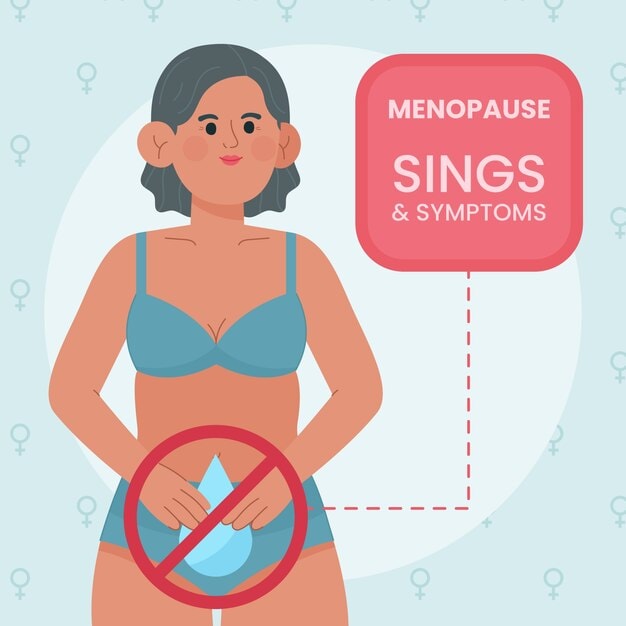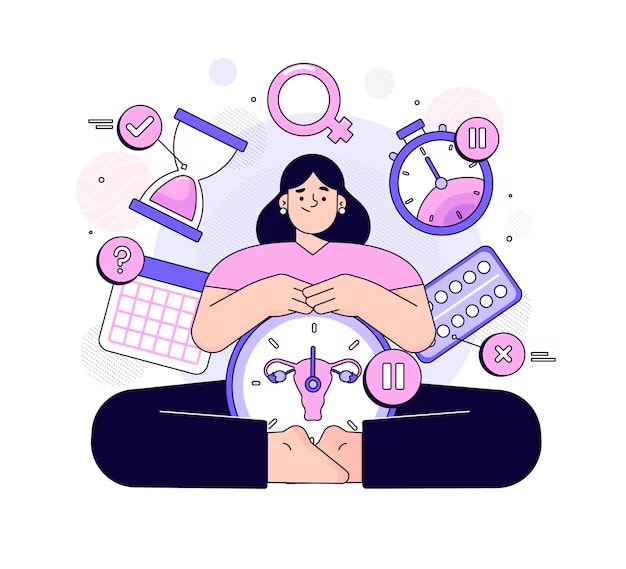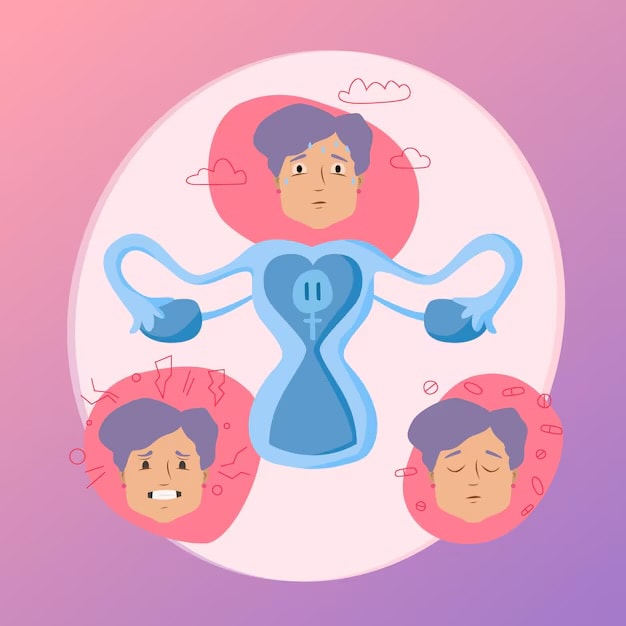
Understanding Menopause: Key Symptoms and Effective Management Tips
Time to read 5 min
Time to read 5 min
Irregular periods
Vaginal dryness
Hot flashes
Night sweats
Sleep problems
Mood changes
Weight gain and slowed metabolism
Thinning hair and dry skin
Menopause is a natural biological condition that marks the cessation of the menstrual cycles of a woman. What is menopause? This is the stage where the ovaries cease to release the egg and that production of estrogen and progesterone hormones declines significantly.
This stage usually occurs between the ages of 45 and 55; however, some women may face early menopause or premature menopause.
Early menopause sets in when menopause occurs before age 45. Actually, some people refer to it as premature menopause, or premature ovarian failure, when menopause begins before the age of 40.
In general, genetic factors, medical treatments, or other autoimmune conditions might be contributing factors that eventually lead to premature menopause.
If the signs and symptoms of menopause are early, one should seek a practitioner in charge to find out what causes the problem and the treatment possible.

The symptoms of menopause vary amongst women, and they frequently reflect changes in hormones, particularly estrogen and progesterone. Here are some common symptoms related to menopause:
Yet another menopause symptom would be disruptions in the sleep patterns that would significantly impact the quality of life. Most such disruptions result from night sweats or hormonal changes and could prevent somebody from falling asleep or, if asleep, from staying asleep.
So, for some women, this time of menopause might be challenging with problems related to sleep. Control of these disruptions in the sleep pattern would improve the general well-being of a woman undergoing this phase.
Menopause gives a feeling of emotions, mood shift, irritability, or even sadness. It relates to hormonal changes, sleep disruption, or just the passing of another phase of life. Emotional well-being is a dimension of health during menopause, and mood-related symptoms can be relieved by addressing them.
She will feel changes in her body appearance during menopause. The lack of estrogen leads to a change in the skin turgor, and the bone density loss makes things all the more challenging for a woman's overall appearance and health.
She may even feel a change in weight and body composition as the body adapts to new hormonal levels. Changes in your body which occur due to this process of menopause are very natural in nature.

Menopause is a natural part of a woman's life cycle. In this stage, the reproductive years are over as eggs in the ovaries stop releasing and hormone levels decline, especially in estrogen and progesterone.
The state leading to the final pause of menstrual periods can take several years and is known as perimenopause. Due to different changes in the body from hormone decline, menopausal symptoms occur.

Effective management of the symptoms of menopause can be tough but there are certain strategies helping to reduce discomfort. Some tips for effective management of dealing with menopause symptoms include:
Hormone therapy is an effective treatment in managing the menopause symptoms such as hot flashes, night sweats, and vaginal dryness. Chemical hormone therapy generally consists of adding estrogen-and in some cases, progesterone to the body to reestablish hormone balance.
However, hormone therapy is not suitable for everybody and carries some risks. If you are eligible for hormone therapy or wish to undergo treatment with hormone therapy, consult your physician, and he/she may decide whether hormone therapy would benefit you; then discuss the alternatives and risks of hormone therapy.
Lifestyle adjustments can be effective in managing symptoms of menopause. Maintaining a good eating habit, regular exercise, and keeping the weight in check may improve health condition, thereby changing some manifestations of symptoms in turn.
Exercise may also reduce risks of heart diseases and osteoporosis, which are risk factors that may increase due to menopause. All these, apart from others, can also ensure well-off bone health, which is a crisis point during menopause.
Menopause is fundamentally a transition period; thus, the many psychological changes that accompany it can be distressing. Stress-reducing practices like mindfulness meditation, yoga, or deep breathing could help mood swings be better controlled as well as emotional well-being.
If the symptoms of mood have changed the way the daily routine is followed, consulting a mental health worker may be helpful. Maintaining mental health in the menopause phase forms an integral part of overall well-being.
If sleep problems caused by menopause symptoms are developing, then the principle of good sleep hygiene may often help sleep quality improve.
Establish a bedtime ritual, avoid caffeine and other stimulants in the hours leading up to the final hours of sleeping and make an effort to enhance a sleep-friendly environment. If it is possible for a woman to control her sleep disruptions, she probably will not feel as fatigued at this point of menopause.
In general, the use of vaginal moisturizers and lubricants may tenderize the vaginal tissues and may sometimes relieve symptoms such as discomfort and dryness related to being postmenopausal, but you need to consult your healthcare provider on which of the products will be suited for your needs.

Once a woman reaches menopause, her body loses estrogen. Because of that, the person might suffer from some increased health risk, like having osteoporosis, heart disease, and other diseases, because of the decrease in estrogen and progesterone. Some health risks associated with menopause are the following:.
While estrogen can play a protective role in the heart, decreased levels can increase the risk of heart disease during postmenopause. The management of the heart should be done both during and after menopause.
Many women gain weight after menopause due to hormonal changes and metabolism. Maintaining an ideal weight will help minimize possible health risks that may develop from it.
In cases where the symptoms of menopause worsen and affect your quality of life, it's probably a good idea to consult with a healthcare provider. It would help you navigate this transition while making appropriate suggestions for treatment.
Because menopause symptomatology is said to vary significantly from person to person, personalizing care would be the most practical course.
It is a very significant change of life for a woman, and support systems play a lot. Family members, friends, and healthcare professionals are supporting her through this transition period.
There are also support groups where she can easily connect with others going through similar symptoms in which she could draw comfort with social support as well as practical assistance to cope with a situation. There may be support systems that will give emotional and practical advice.

Menopause is such a normal phenomenon in life that eventually befalls all women as the body transitions out of their productive years. Though it's somewhat difficult to cope with the symptoms, what matters is if one understands what is happening in the body and develops proper strategies for management.
From hot flashes and dry vaginal passages to mood swings and sleep problems, there are ways to manage the symptoms of this stage of life. One must see a healthcare professional and determine the best course of action-to use hormone therapy, make lifestyle adjustments, or do other treatments.
So, being menopausal can very well be a time of transformation, and with proper support, can also be an opportunity for personal growth and care.
Medical Disclaimer - The following information is for educational purposes only. No information provided on this website, including text, graphic, and images, are intended as substitutes for professional medical advice. Please consult with your doctor about specific medical advice pertaining to your condition(s).